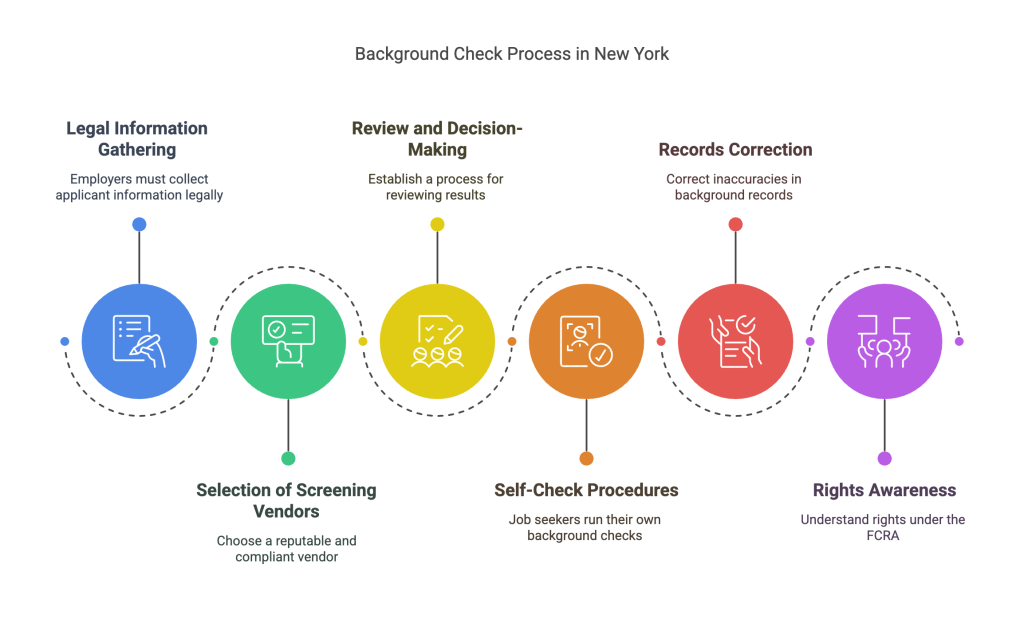Understanding how to get a background check in New York can be a complex but crucial process for both employers and job seekers. The state's legal framework, technological advancements in screening, and social considerations all potentially impact this procedure. This guide will provide a detailed, evidence-based roadmap to help navigate these requirements with confidence and clarity.
Key Takeaways
- Compliance with New York's background check laws, like the Fair Credit Reporting Act and Article 23-A, is crucial for both employers and candidates.
- Digital technologies have made background checks faster and more accurate but raise important data privacy concerns you need to address.
- Background checks can limit job opportunities for people with past infractions, necessitating a fair assessment that considers rehabilitation.
- Employers should develop clear policies and regularly train their HR teams to ensure they remain compliant and fair in recruitment practices.
- Staying informed about changing regulations and technological advancements can help you make informed decisions and improve the hiring process.
Introduction
Background checks have become a crucial part of hiring, especially in New York. Given its diverse job market, employers and job seekers alike must understand the detailed process behind these checks. You might wonder why background checks are so important. They help establish trust, maintain security, and ensure compliance with legal standards. They aren't just about finding red flags; they're about ensuring the right fit for both employer and employee.
This guide focuses on understanding the complexities of obtaining a background check in New York. We'll explore the legal landscape, leverage technological tools, and consider the social effects that these checks can have. Get ready to tackle New York's background check requirements with practical, informed steps.
Legal Framework for Background Checks in New York
New York has specific laws that shape how background checks should be conducted. If you're conducting or undergoing a background check, you'll encounter the Fair Credit Reporting Act (FCRA) and New York’s Correction Law Article 23-A. The FCRA provides a national framework, ensuring fair handling of personal data in reports. In New York, Article 23-A addresses how prior criminal convictions can affect employment decisions. It aims to prevent discrimination based on criminal history unless it directly relates to the job or poses safety risks.
The "Ban the Box" law plays a significant role here. It delays when employers can ask about criminal histories. Employers in New York can't ask about convictions until later in the hiring process. This fosters fairer opportunities by letting candidates demonstrate their qualifications without early bias.
For employers, compliance is key. Before initiating a check, you must get written consent from the candidate. If something negatively impacts a hiring decision, inform the candidate with specifics and offer a chance to contest it. Provide resources for disputing inaccuracies and supply the necessary legal notices.
Once a background check is complete, there are steps to follow. If adverse information leads you to reconsider a candidate, explain your decision, and provide the chance to dispute findings. Candidates have a right to know what's found and have errors corrected.
Understanding these legal nuances helps you stay compliant and make informed decisions. Are your current hiring practices aligned with New York's regulations?
Technological Developments in Background Checks
Technology has revolutionized the background check process, making it faster and more efficient. Digital background screening now relies heavily on automation and digital databases. Online platforms quickly pull information from multiple sources, including criminal records, education verification, and employment history, reducing the time it takes from days to mere hours.
As these systems become more sophisticated, they enhance accuracy but also raise concerns about data privacy. You must understand that the data used in these checks often includes sensitive information. It's crucial to ensure that the companies you work with comply with privacy laws like the General Data Protection Regulation (GDPR) and New York's privacy standards. This compliance helps protect candidate information from unauthorized access or misuse.
Identity verification has also seen significant advancements. Biometric verification and blockchain technology offer more secure and reliable ways to confirm a candidate's identity. For example, verifying a candidate's identity through a fingerprint scan or facial recognition ensures that the person undergoing the background check is who they claim to be.
By integrating these technologies, employers can streamline their hiring process, reduce errors, and make more informed decisions. However, consider whether these advanced methods respect candidates' privacy and comply with legal standards. The balance between leveraging technology and maintaining privacy is delicate yet crucial.
Staying informed about the latest technological trends in background checks can give you an edge. Are you confident that your current process aligns with these technological possibilities and privacy obligations?
Social Implications of Background Checks
Background checks have a significant impact on employment opportunities, particularly for those with past infractions. In New York, the stringent nature of these checks can act as a barrier to employment, affecting a candidate’s ability to secure a job long after their sentence is served. For many, this means facing difficulties in starting fresh, even when they're qualified and eager to work. Employers should weigh the need for workplace safety against the possibility of hindering someone's second chance. Would denying employment to a reformed individual truly enhance your company's security?
The balancing act doesn't stop there. Supporting rehabilitation and reentry is essential. Society benefits when people reintegrate successfully, reducing recidivism. Employers can be part of this societal change by opening pathways for individuals with criminal records. Consider adjusting your approach to allow for context when reviewing a candidate’s past. Has the individual made strides in personal development since the incident? What structures do you have in place to evaluate this?
Then there's the risk of bias and discrimination, often an unintentional byproduct of background checks. Minority communities might disproportionately bear the brunt of these biases. Employers must therefore pursue fair hiring practices conscientiously. This includes regular training to identify and mitigate bias in review processes. Are your background checks bringing diversity to your team or stifling it? It’s crucial for companies to establish fair hiring benchmarks. By doing so, they contribute to a more equitable workforce and society.
How to Get a Background Check in New York

Employer Process
Legal Information Gathering: In New York, you must collect applicant information in compliance with state laws. Start by obtaining consent from the candidate. Clearly explain the purpose of the background check and how the information will be used. Ensure that your consent forms are compliant with both New York state laws and the Fair Credit Reporting Act (FCRA).
Selection of Screening Vendors: Choose a background screening vendor that is reputable and complies with legal standards. Look for accreditation from the Professional Background Screening Association (PBSA) as a benchmark of quality and compliance. Verify that the vendor provides accurate and timely reports.
Review and Decision-Making: Establish a clear process for reviewing background check results. Consider the relevance of any discovered information to the job role. For any negative findings, give the candidate a chance to explain before making final hiring decisions. Document every step to maintain compliance and fairness.
Job Seeker Preparation
Self-Check Procedures: Before applying for jobs, run your own background check. This can help you identify and address any potential issues. Services like GoodHire or Checkr offer personal checks that mirror what employers might see.
Records Correction: If you find inaccuracies in your background check, contact the reporting agency to correct them. For errors in criminal records, reach out to the appropriate court. For credit report issues, contact the credit bureau.
Rights Awareness: Familiarize yourself with your rights under the FCRA. If an employer decides not to hire you based on your background check, they must provide you with a copy of the report and your rights under FCRA. You have the right to dispute inaccuracies and have the opportunity to clear up any discrepancies.
Getting a background check in New York involves understanding legal requirements, choosing the right partners, and preparing adequately as a job seeker. Whether you're on the employer side or the candidate side, knowing your rights and obligations is key to a smooth process.
Actionable Takeaways
Create a policy framework that fits New York's background check requirements. Establish clear guidelines that ensure compliance with state laws, like the Fair Credit Reporting Act and Article 23-A, to protect both your business and your candidates. Regularly review and adjust your policies to reflect any legal changes.
Educate your HR team. Regular training sessions can help your team understand the latest laws and best practices for background checking. This ensures fair treatment of candidates and reduces the risk of legal missteps. Tools like webinars or workshops can be very effective.
Stay updated on laws and technology. Background check regulations and technologies are constantly evolving. Subscribing to industry newsletters or joining relevant professional groups can help you stay informed. This vigilance helps manage risks and leverage new tools effectively.
Conclusion
Navigating New York's background check requirements involves understanding and balancing legal, technological, and social factors. As discussed, employers must comply with regulations like the FCRA and New York Correction Law Article 23-A, while also considering the implications of "Ban the Box" laws. The rise of digital tools means background checks are more efficient, but they also pose challenges in data privacy. Socially, these checks can impact employment for those with past infractions, emphasizing the need for fair hiring. Employers should create comprehensive policies, train HR teams, and keep abreast of legal changes to manage these complexities. Balancing this with a touch of empathy ensures not only compliance but also fairness in employment practices.

GCheck Editorial Team
Meet the GCheck Editorial Team, your trusted source for insightful and up-to-date information in the world of employment background checks. Committed to delivering the latest trends, best practices, and industry insights, our team is dedicated to keeping you informed.
With a passion for ensuring accuracy, compliance, and efficiency in background screening, we are your go-to experts in the field. Stay tuned for our comprehensive articles, guides, and analysis, designed to empower businesses and individuals with the knowledge they need to make informed decisions.
At GCheck, we're here to guide you through the complexities of background checks, every step of the way.





